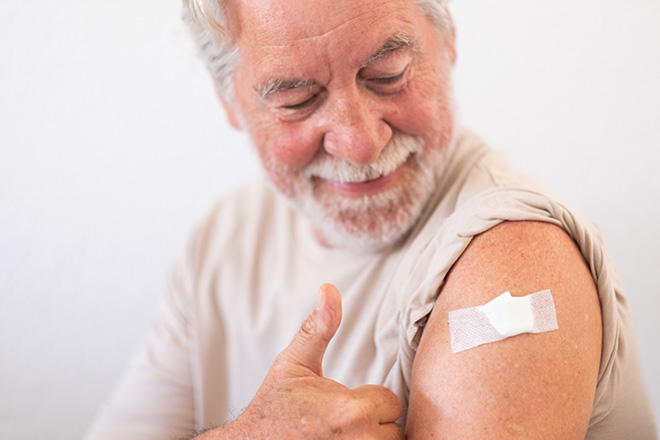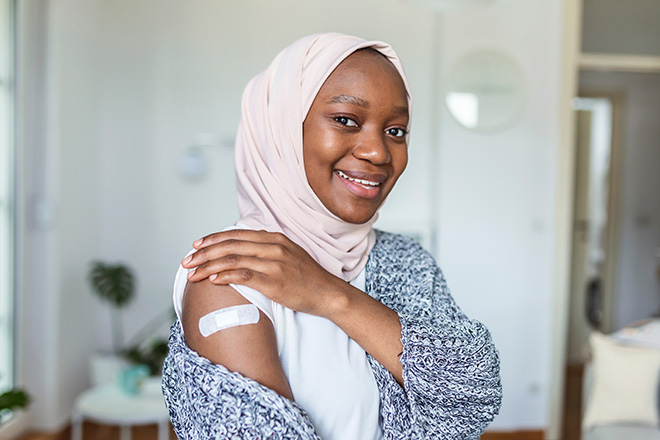
Deciphering what COVID-19 vaccination information to trust is particularly stressful for people affected by cancer. But with your support, we're providing reliable information to them and their loved ones.
Cancer Council Victoria is launching a campaign targeted at Victorians affected by cancer in response to the overwhelming amount of vaccine-related misinformation available in the media, online, and even through word of mouth.
The campaign aims to explain the increased risk of COVID-19 for people with cancer. It also encourages them to contact our cancer nurses on 13 11 20 or their doctor to make an informed decision.
Additionally, the campaign directs people to our online resources, which are continually updated as we learn more about the vaccines and the specific needs of people with cancer.
Our nurses are equipped to answer a range of questions around COVID-19 and the vaccine – including eligibility criteria, vaccine type, advice for carers and households and how people with cancer are being prioritised for access to vaccines.
We’re urging people with cancer, their carers, and their families to act – get the facts to protect you and your loved ones against COVID-19.
What you need to know.
Everyone aged 16 years and over is eligible to get a COVID-19 vaccine. Young people aged 12-15 are eligible if they have an underlying medical condition, including people with or recovering from cancer. This is because they are at higher risk of severe disease and are therefore prioritised for COVID-19 vaccination. Getting the COVID-19 vaccine:
- reduces your risk of getting sick with COVID-19
- protects you against becoming very sick if you do get COVID-19
- helps to protect your friends, family and community.
Top 5 facts
- People with cancer who contract COVID-19 are twice as likely to have severe symptoms and require hospital treatment.
- If you contract COVID-19, your cancer treatment could be disrupted.
- People with cancer are at no greater risk of side effects from COVID-19 vaccines than anyone else.
- Vaccination is safe and recommended for the majority of people affected by cancer.
- If most people are vaccinated, the virus can’t spread as easily. This also protects people who can’t get vaccinated, such as young children who are not yet eligible.
How to book your vaccination
- To help people get vaccinated who are at higher risk of contracting or getting very sick from COVID-19, appointments are being reserved for the Pfizer vaccine at vaccination centres.
- To book at a reserved appointment, call the Coronavirus Hotline on 1800 675 398 and specify that you are undergoing or recovering from cancer treatment. For an interpreter, press 0.
- People with a pre-existing medical condition and/or disability are encouraged to receive a COVID-19 vaccine by your doctor. They'll be able to talk to you about your health and any questions you have.

Demand for factual vaccine information
The campaign’s importance is highlighted as Cancer Council’s 13 11 20 information and support line reports a significant increase in the number of people contacting the service for advice on the vaccines.
The number of enquiries received by 13 11 20 about the vaccinations nearly doubled when comparing figures from March and June of this year.
The nurses reported common queries about the vaccines, including:
- When people with cancer should have their vaccination in relation to their treatment schedule.
- Practical concerns around how people with cancer can get vaccinated safely (as many cancer patients are immunocompromised).
- Information around which vaccine is more suitable for people with cancer.
- Concerns around blood clotting with the AstraZeneca vaccine and if the advice is different for people with cancer.
Our 13 11 20 information and support line is largely funded by people like you. Thank you for ensuring our nurses can respond to every request for cancer information.
Researching attitudes to COVID-19 vaccination among people with cancer
Thanks to your support, Cancer Council Victoria and the Peter MacCallum Cancer Centre are conducting a survey to better understand how cancer patients feel about receiving the COVID-19 vaccination.
This is in response to both the cluttered media landscape that’s creating confusion and, at times, spreading misinformation, as well as the rise in demand for reliable vaccine information.
The survey, which has just closed, asks both vaccinated and unvaccinated people with cancer about their experiences and attitudes in relation to vaccination.
The results will be used to tailor information, communications and strategies for people affected by cancer to better understand and access the COVID-19 vaccine.
Where to find COVID-19 vaccination advice
If you or someone you know are looking for reliable information around the COVID-19 vaccines for people affected by cancer, visit our website .
Our highly experienced cancer nurses are equipped to answer your questions. Call 13 11 20 or contact us online.
